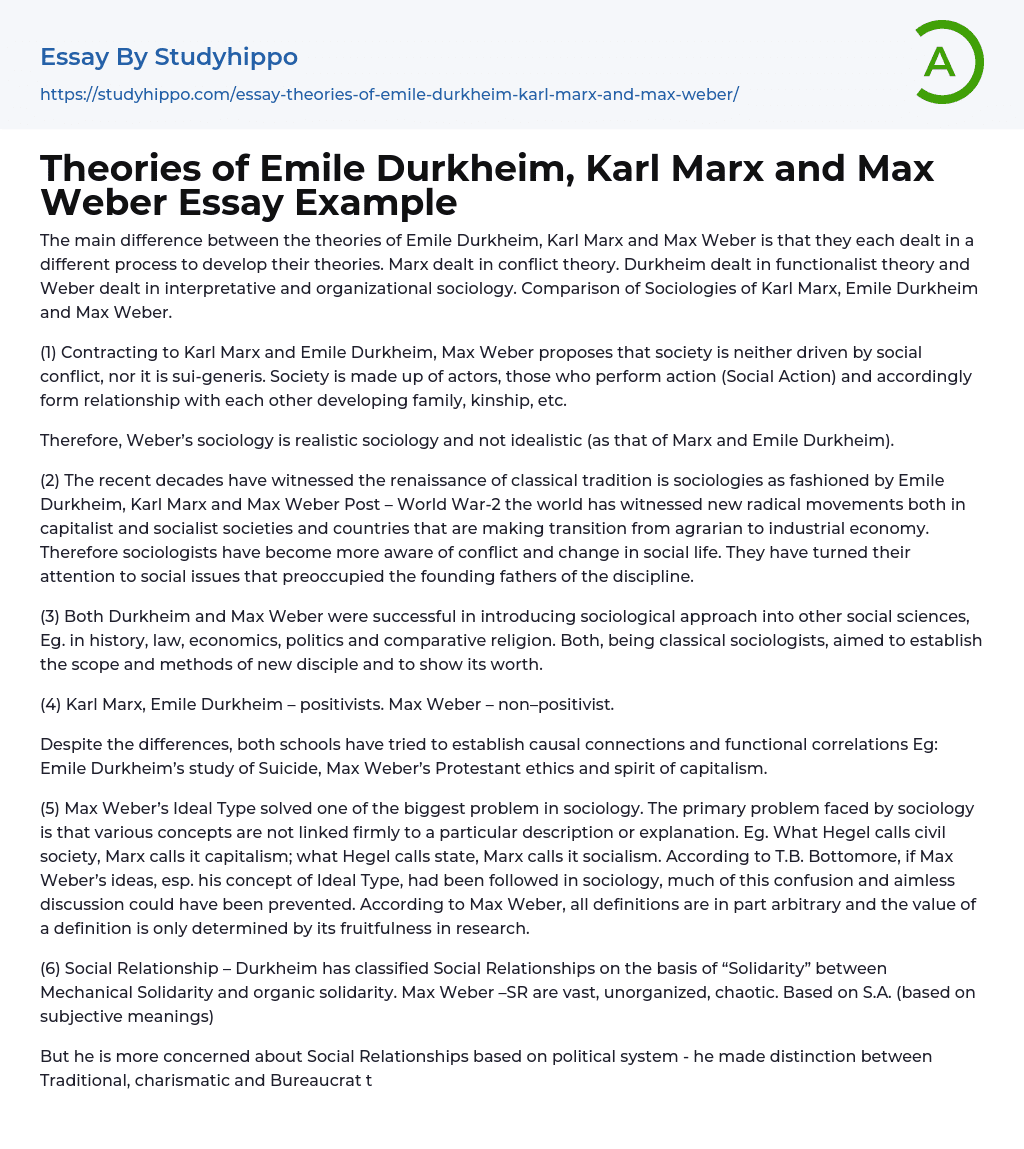

Theories of Emile Durkheim, Karl Marx and Max Weber Essay Example
The main difference between the theories of Emile Durkheim, Karl Marx and Max Weber is that they each dealt in a different process to develop their theories. Marx dealt in conflict theory. Durkheim dealt in functionalist theory and Weber dealt in interpretative and organizational sociology. Comparison of Sociologies of Karl Marx, Emile Durkheim and Max Weber.
(1) Contracting to Karl Marx and Emile Durkheim, Max Weber proposes that society is neither driven by social conflict, nor it is sui-generis. Society is made up of actors, those who perform action (Social Action) and accordingly form relationship with each other developing family, kinship, etc.
Therefore, Weber’s sociology is realistic sociology and not idealistic (as that of Marx and Emile Durkheim).
(2) The recent decades have witnessed the renaissance of classical tradition is sociologies as fashioned
...by Emile Durkheim, Karl Marx and Max Weber Post – World War-2 the world has witnessed new radical movements both in capitalist and socialist societies and countries that are making transition from agrarian to industrial economy. Therefore sociologists have become more aware of conflict and change in social life. They have turned their attention to social issues that preoccupied the founding fathers of the discipline.
(3) Both Durkheim and Max Weber were successful in introducing sociological approach into other social sciences, Eg. in history, law, economics, politics and comparative religion. Both, being classical sociologists, aimed to establish the scope and methods of new disciple and to show its worth.
(4) Karl Marx, Emile Durkheim – positivists. Max Weber – non–positivist.
Despite the differences, both schools have tried to establish causal connections and functional correlation
Eg: Emile Durkheim’s study of Suicide, Max Weber’s Protestant ethics and spirit of capitalism.
(5) Max Weber’s Ideal Type solved one of the biggest problem in sociology. The primary problem faced by sociology is that various concepts are not linked firmly to a particular description or explanation. Eg. What Hegel calls civil society, Marx calls it capitalism; what Hegel calls state, Marx calls it socialism. According to T.B. Bottomore, if Max Weber’s ideas, esp. his concept of Ideal Type, had been followed in sociology, much of this confusion and aimless discussion could have been prevented. According to Max Weber, all definitions are in part arbitrary and the value of a definition is only determined by its fruitfulness in research.
(6) Social Relationship – Durkheim has classified Social Relationships on the basis of “Solidarity” between Mechanical Solidarity and organic solidarity. Max Weber –SR are vast, unorganized, chaotic. Based on S.A. (based on subjective meanings)
But he is more concerned about Social Relationships based on political system - he made distinction between Traditional, charismatic and Bureaucrat type of authority.
Thus, while Emile Durkheim gave primary important to “solidarity” in sociology, Max Weber gave important to “Social Action”. This concept has been celebrated and widely used in contemporary sociology by Talcott Parson, Robert K. Merton and later Sprott.
(7) The contemporary sociology is much less concerned with the construction of all embracing theories than during the time of Emile Durkheim and Max Weber. For this development, sociology owes much to Max Weber who considered reality as vast, unorganized, chaotic which cannot be studied entirely .Therefore one should not develop “Grand theories” (like Karl
Marx and Emile Durkheim) but use ideal type to study social phenomena.
- Anthropology essays
- Audience essays
- Charity essays
- Cultural Competence essays
- Emile Durkheim essays
- Gender Roles essays
- Generation essays
- Globalization essays
- Interpersonal Relationship essays
- People essays
- Race essays
- Social Change essays
- Social Class essays
- Social Movement essays
- Social Science essays
- Social Status essays
- Social Stratification essays
- Society essays
- Sociological Imagination essays
- Sociological Perspective essays
- Sociological Theories essays
- Stereotypes essays
- Web Dubois essays
- American Dream essays
- Barriers To Entry essays
- Capitalism essays
- Central Bank essays
- Compensation essays
- Consumerism essays
- Economic Development essays
- Economic Growth essays
- Economic Inequality essays
- Economic System essays
- Economy essays
- Employment essays
- Export essays
- Finance essays
- Free Trade essays
- Gross Domestic Product essays
- Human Development essays
- Income Inequality essays
- Industry essays
- Inflation essays
- International Business essays
- International Trade essays
- Macroeconomics essays
- Materialism essays
- Max Weber essays
- Microeconomics essays
- Minimum Wage essays



